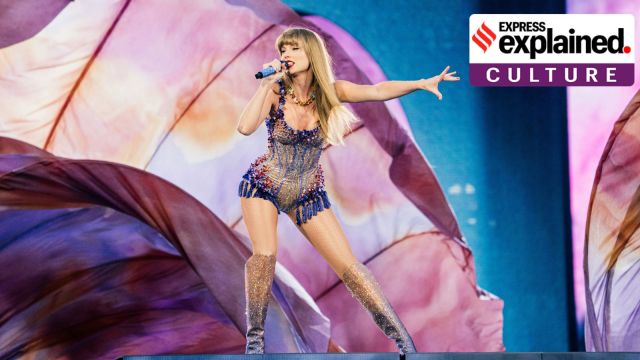Taylor Swift finally owns all her master recordings: the story, and why this is significant
Friday’s announcement culminated a six-year-long saga when the Scooter Braun-owned Ithaca Holdings acquired her masters in 2019. The resulting ‘feud’ between Swift and Braun would have reverberations on the industry going forward.
 In a letter on her website, Taylor Swift formally announced that she had purchased the master recordings of these albums from investment firm Shamrock Capital. (NYT File Photo)
In a letter on her website, Taylor Swift formally announced that she had purchased the master recordings of these albums from investment firm Shamrock Capital. (NYT File Photo)“You belong with me”, read the caption of superstar musician Taylor Swift’s Instagram post on Friday (May 31), recalling the eponymous single off her second studio album, Fearless. She posed triumphantly with the covers of her first six albums: Taylor Swift (2006), Fearless (2008), Speak Now (2010), Red (2012), 1989 (2014), and Reputation (2017).
View this post on Instagram
In a letter on her website, she formally announced that she had purchased the master recordings of these albums – the copyrighted recordings used for analogue and digital duplication – from investment firm Shamrock Capital. This means that for the first time in about 20 years, she owns the recordings to all the music she has created.
“All I’ve ever wanted was the opportunity to work hard enough to be able one day to purchase my music outright — with no strings attached, no partnership, with full autonomy. I will be forever grateful to everyone at Shamrock Capital for being the first people to ever offer this to me,” she wrote.
According to a Billboard article, she purchased the masters for $360 million.
Friday’s announcement culminated a six-year-long saga when Ithaca Holdings, then owned by record executive Scooter Braun, acquired her masters in 2019. The resulting ‘feud’ between Swift and Braun would have reverberations on the industry going forward.
Prologue: Who owns the music?
A year before the seminal feud erupted, Swift announced that she was parting ways with Big Machine Records, the record label she had been affiliated with since its inception in 2005. Her contract with the record label expired after she completed her tour for her sixth album, Reputation (2017). This contract, which she signed as a 15-year-old in 2005, had her sign over the ownership of the masters of her first six albums to the company. At the time, her departure had reportedly been described as amicable.
Her new record deal with Republic Records, an imprint of Universal Music Group, captivated industry attention for its terms. The agreement allowed her to retain ownership of her master recordings. More importantly, it ensured that if UMG were to sell its $1 billion stake in music streaming company Spotify, it would share any resulting proceeds with its musicians, regardless of UMG’s financial status.
 Slides from Taylor Swift’s Instagram post on November 19, 2018, announcing her new record deal with Republic Records (Instagram/Taylor Swift)
Slides from Taylor Swift’s Instagram post on November 19, 2018, announcing her new record deal with Republic Records (Instagram/Taylor Swift)
The Spotify clause “meant more to me than any other deal point” of her new contract, she wrote in an Instagram post. This clause cemented her status in the industry as the “saviour of underpaid artists”, as an article in The Guardian described her in November 2018.
The feud that got the ball rolling
Cut to June 2019. Swift had announced her first album under the new agreement, Lover (2019), and had dropped the first single, You Need to Calm Down, an anthem celebrating Pride and her freedom to own her music for the first time.
On June 30, Braun’s Ithaca Records announced its acquisition of Big Machine Records for $330 million from its CEO, Scott Borchetta, including the masters of Swift’s albums.
Braun’s acquisition of her life’s work until that point was a personal peeve for Swift, and she accused him of “incessant, manipulative bullying” in a Tumblr post decrying the sale of her masters to him. Braun managed fellow musicians Kanye ‘Ye’ West and Justin Bieber, both of whom had repeatedly harassed her on social media in the past.
West had infamously upstaged her receipt of the Best Female Video award at the 2009 MTV Video Music Awards (VMAs), claiming fellow musician Beyonce Knowles was the rightful winner. And in 2016, he “organised a revenge porn music video (Famous)”, which Swift recalled in the post. In the post, she described the situation as her “worst case scenario” and accused Braun of “stripping” her of her life’s work.
She also wrote that she had tried to buy back her masters from Big Machine, but was instead “given an opportunity to sign back up to Big Machine Records and ‘earn’ one album back at a time, one for every new one I turned in.”
Borchetta disputed these claims in a statement the next day, saying, “Taylor had every chance in the world to own not just her master recordings but… She chose to leave,”. He also described Scooter Braun as “a supporter and honest custodian for her music.”
The situation devolved further in November 2019, when she accused Borchetta and Braun of barring her from performing music from these albums at the American Music Awards. “Scott Borchetta and Scooter Braun have now said that I’m not allowed to perform my old songs on television because they claim that would be re-recording my music before I’m allowed to next year,” she wrote in a Tumblr post.
She also alleged that the duo would permit her to perform her music on two conditions: “If I agree to not re-record copycat versions of my songs next year (which is something I’m both legally allowed to do and looking forward to) and also told my team that I need to stop talking about him and Scooter Braun”.
Big Machine Records denied these allegations, and eventually came to a licensing agreement allowing Swift to perform her old music on “mutually agreed streaming platforms,” including the AMAs.
The Great Re-Recording Project
Swift announced her intent to re-record the six albums on a talk show in August 2019, and said she would be eligible to do so a year later. The logic was simple – the re-recorded versions would be fully owned by her, while Braun would continue to profit off anyone playing the original versions of her songs.
She confirmed the re-recording was underway in November 2020, even as news broke of a second sale of her masters, this time to Shamrock Capital.
In a post on Twitter, she wrote that she was alerted about the sale by Shamrock, who had reached out to her, hoping to collaborate on this catalogue. On learning that Braun would continue to be in the picture even after her sale, she turned this down. Any collaboration with Shamrock would contractually provide Braun with a share of her profits even after the sale, while her attempts to purchase her masters meant signing a Non-Disclosure Agreement demanding she never disparage Braun again.
Been getting a lot of questions about the recent sale of my old masters. I hope this clears things up. pic.twitter.com/sscKXp2ibD
— Taylor Swift (@taylorswift13) November 16, 2020
She promptly shut the door on all such negotiations.
Swift continued recording and releasing music through the pandemic, releasing the critically acclaimed sister albums Folklore and Evermore in 2020. However, the re-releases of Fearless (Taylor’s Version) and Red (Taylor’s Version) in 2021 changed the game forever.
While the album announcements were accompanied by the cryptic social media posts that sent Swifties (her fans) into a tizzy, speculating the order in which the tracks would be released, the albums themselves featured unreleased music, dubbed “From The Vault”, and new collaborations with fellow artists. Both albums topped the Billboard 200 charts that year, and a 10-minute version of her song All Too Well (Taylor’s Version) dethroned Don McLean’s American Pie for the longest song to be ranked Number One on the Billboard Hot 100.
Her subsequent re-releases, Speak Now (Taylor’s Version) and 1989 (Taylor’s Version), were met with the same fanfare in 2023. Her Eras tour (2023-24), which she called “a journey through the musical eras of (her) career”, further cemented her status as the top pop star in the industry.
Why this is a big deal
As a TIME article notes, Swift’s struggle to cement her ownership of her masters recognises a simple truth that “artists, even those with brands as powerful as hers, are vulnerable to exploitation.”
In a March 2021 Instagram post, Swift wrote, “Artists should own their own work for so many reasons. But the most screamingly obvious one is that the artist is the only one who really knows that body of work.”
This statement captured a sentiment widely felt by several artists who have spoken out against the terms of their record contracts, including Kanye West himself.
The industry remains forever changed, with artists seeking to reclaim ownership of their body of work or agency over its exhibition. Olivia Rodrigo told The Guardian in 2021 that she negotiated a contract retaining control of her masters following Swift’s example, while Joe Jonas of the Jonas Brothers and rapper Snoop Dogg expressed interest in re-recording their debut albums. And R&B artist SZA acknowledged Swift’s efforts in her 2023 Billboard Woman of the Year interview, saying she “deeply applaud(ed)” that.
- 01
- 02
- 03
- 04
- 05






































